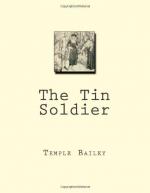He had her attention now. “Make—elephants?”
“Yes. He needs only a pattern. There are certain things he has forgotten. I should like to make him happy.”
Miss Emily, hostilely convinced that it was not her business to contribute to the happiness of any octogenarian Hun, shook her head, “I’m sorry.”
“Then you won’t sell him?”
“Certainly not.”
He still lingered. “You love your toys—I have been here before, and I have watched you. They are not just sawdust and wood and cloth and paint to you—they are real—”
“Yes.”
“My father is like that. They are real to him. There’s an old wax doll that was my mother’s. He loves her and talks to her—. Because she was made in that Germany which is dead—”
The fierceness in his voice, the flash of his eye; the thrust of his hand as if it held a rapier!
“Dead?”
“The Germany he knew died when Prussia throttled her. Her poetry died, her music—there is no echo now from the Rhine but that of—guns.”
“You feel—that way—?”
“Yes.”
“Then sit down and tell me—tell me—” She was eager.
“Tell you what?”
“About your father, about the toys, about the Germany that is—dead.”
He was glad to tell her. It poured forth, with now and then an offending phrase, “Gott in Himmel, do they think we have forgotten? My father came to America because he loved freedom—he fought in the Civil War for freedom—he loves freedom still; and over there they are fighting for slavery. The slavery of the little nations, the slavery of those who love democracy. They want Prussia, and more Prussia, and more Prussia—” He struck his hand on the counter so that all the dolls danced.
“They are fighting to get the whole world under an iron heel—to crush—to grind—to destroy. My father reads it and weeps. He is an old man, Fraeulein, and his mind goes back to the Germany which sang and told fairy tales, and made toys; do you see?
“Yet there are people here who do not understand, who point their fingers at him, at me. Who think because I am Ulrich Stoelle that I am not—American. Yet what am I but that?”
He got up and walked around the room restlessly. “I am an American. If I was not born here, can I help that? But my heart has been moulded here. For me there is no other country. Germany I love—yes, but as one loves a woman who has been led away—because one thinks of the things she might have been, not of the thing she is.”
He came back to her. “Will you sell me your elephant, Fraeulein?”
She held out her hand to him. Her eyes were wet. “I will lend him to your father. Indeed, I cannot sell him.”
He took her hand in a strong grasp. “I knew you were kind. If you could only see my father.”
“Bring him here some day.”




